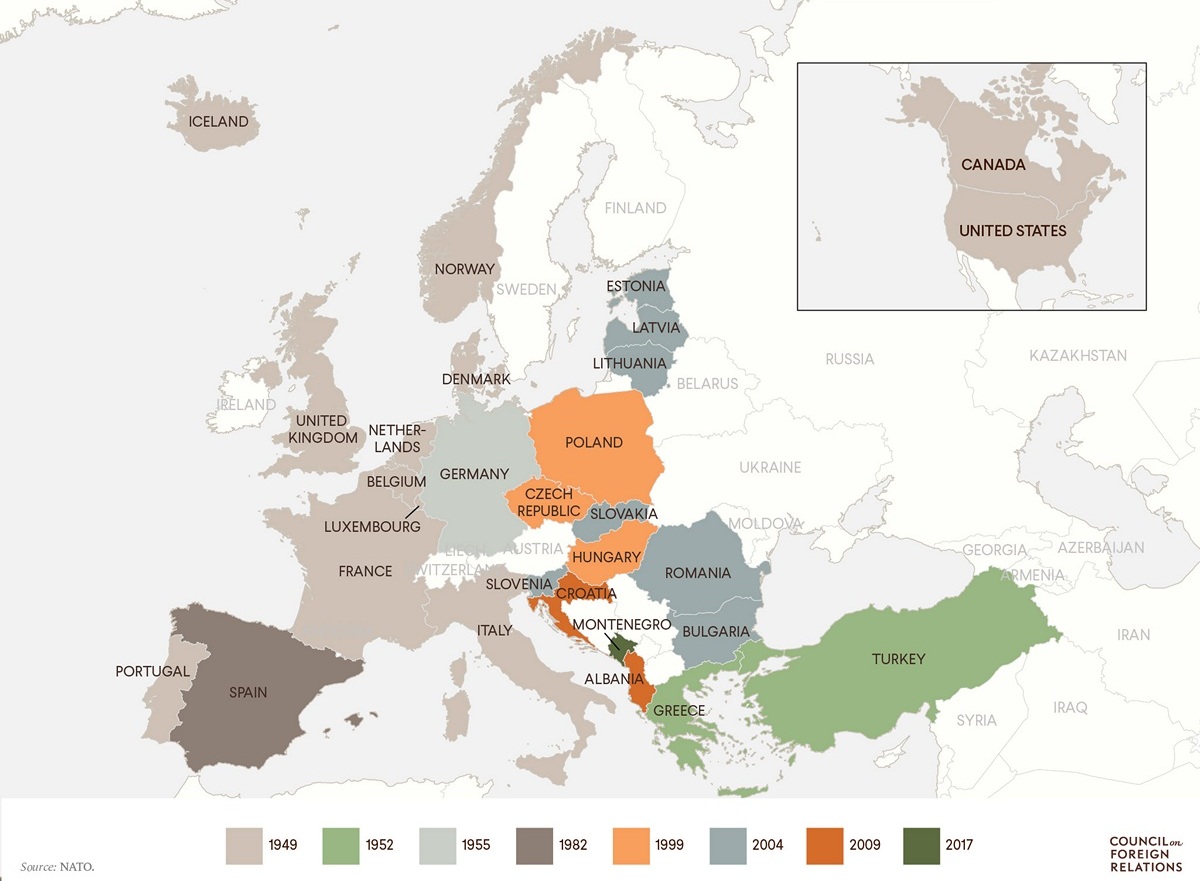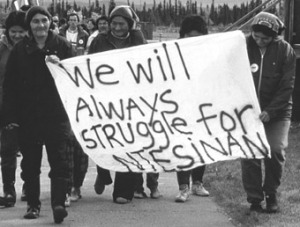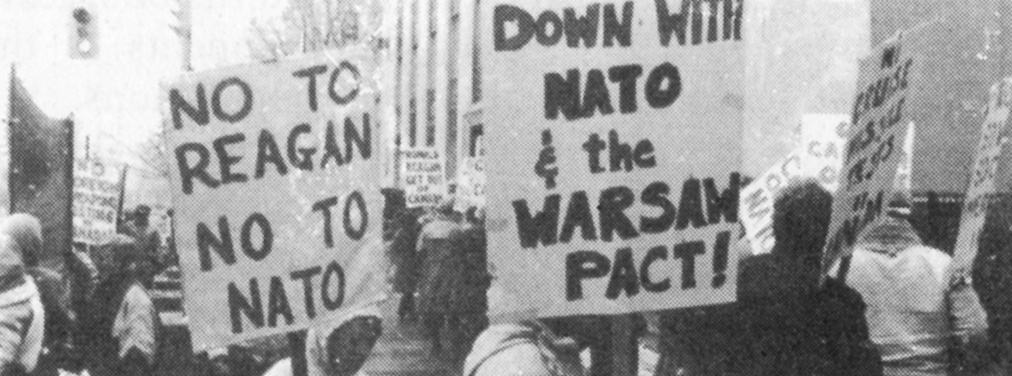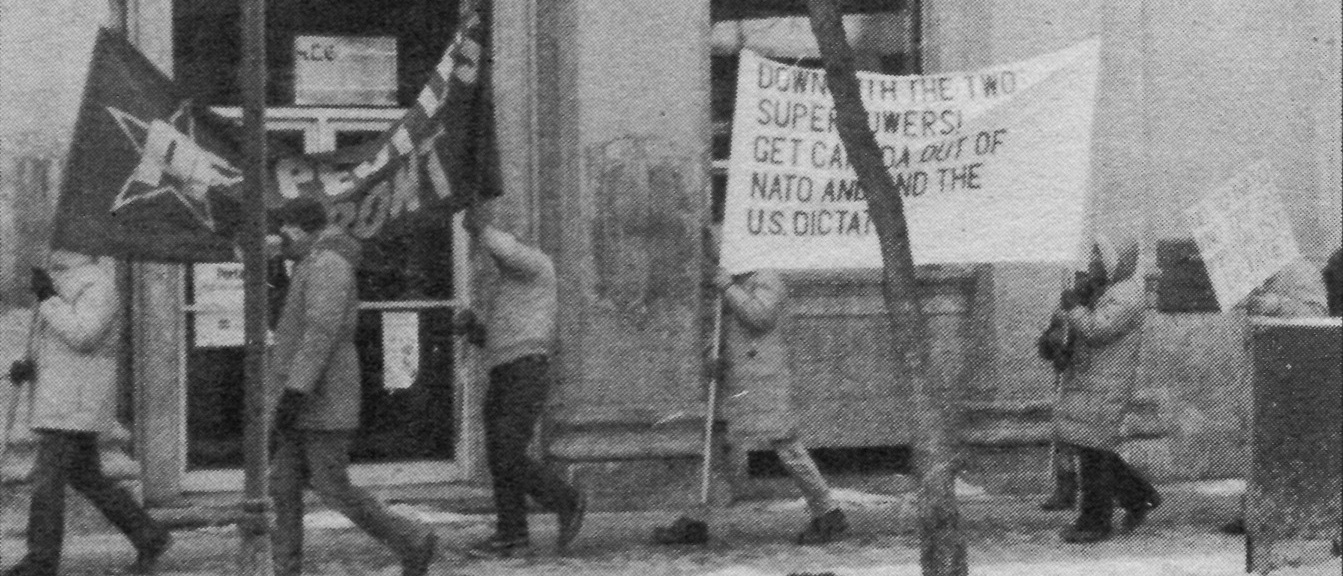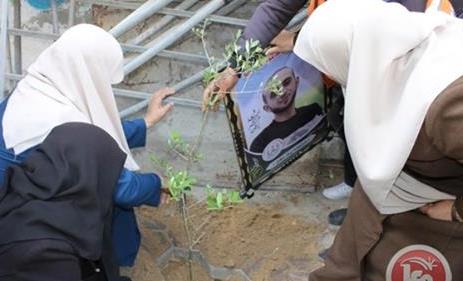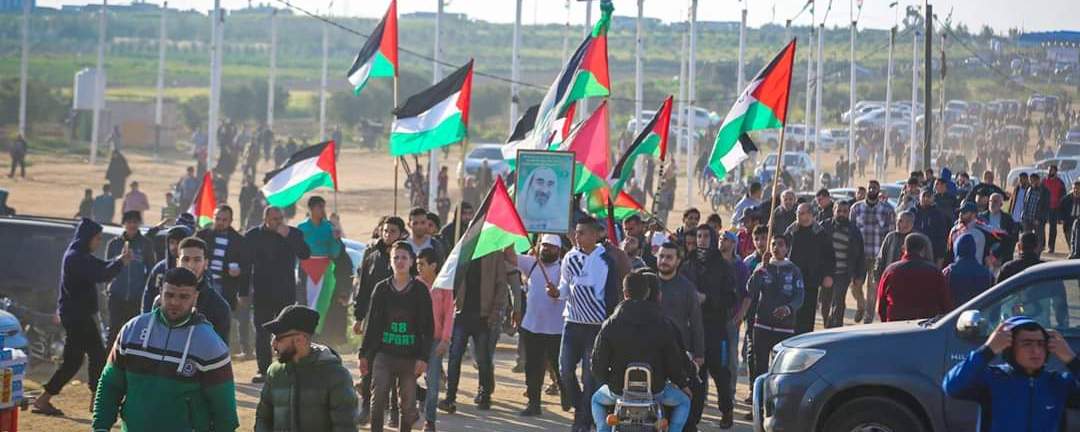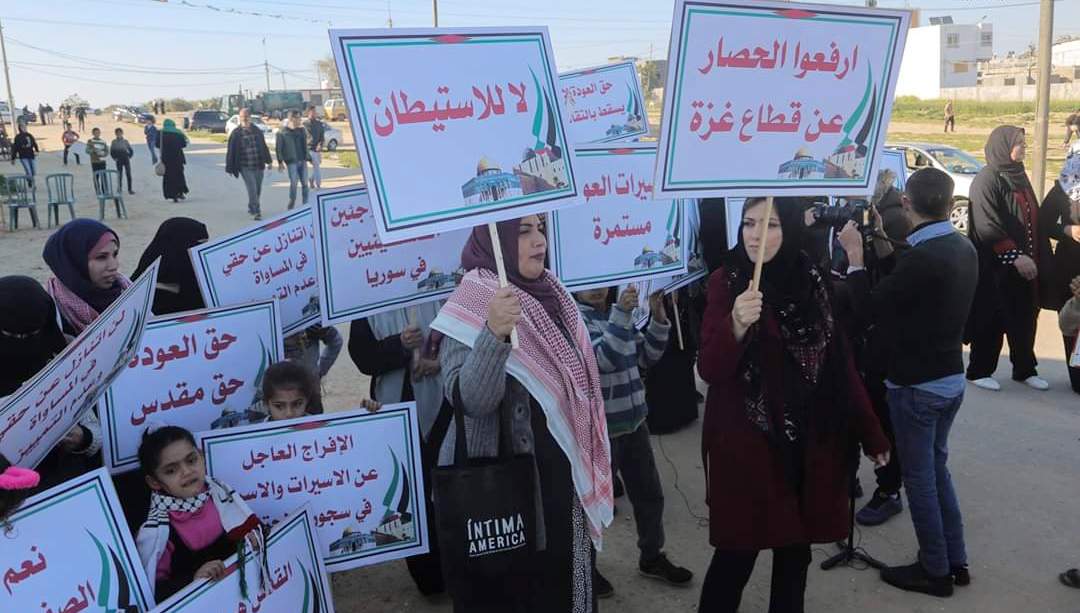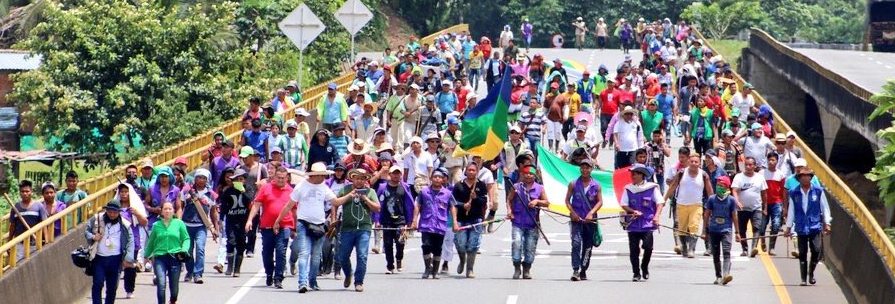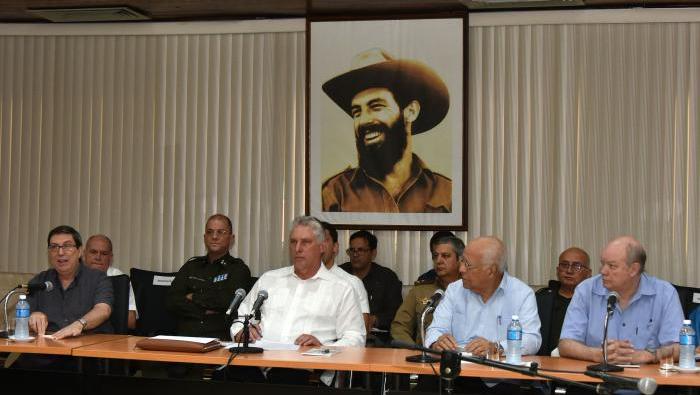
|
March 30, 2019 - No. 11
• No to NATO!
Dismantle NATO! Make Canada a Zone for Peace!
• Long Live the Palestinian People and Their Resistance! - La Jornada - • Cuba
Condemns USA's Recognition of Occupied Syrian - Cuban Ministry of Foreign Relations -
• Evidence of U.S.-Led Terrorist Plots
• Adherence to Peace Agreement Demanded - Raúl Antonio Capote - • National
March for Life Gains Support and Momentum • There Is but One Foreign Policy of the Cuban Revolution - Yaima Puig Meneses - 70th Anniversary of the Founding of NATO No to NATO!
Dismantle NATO!
|
|
|
Not only is Canada's membership in NATO an assault on
the
people's sovereignty because a foreign power decides all matters
related to war and peace on behalf of the people, but even
Parliament does not have a say over matters of war and peace
because they are matters of executive privilege and/or Royal
Prerogative. For example, the United States secretly deployed
nuclear bombs in 27 countries and territories during the Cold
War, including Canada. The agreements were known only by the
Prime Minister and a handful of selected cabinet ministers. On
August 28, 1950 -- using the Royal Prerogative -- Prime Minister
Louis St. Laurent secretly agreed to the storage of 11 atomic
bombs at Goose Bay, Labrador, the closest U.S. nuclear storage
site to Europe. According to the secret history of the Security
Section of the 43rd Bombardment Wing, cited by Professor John
Clearwater in his Canadian Nuclear Weapons: The Untold Story
of Canada's Cold War Arsenal, "Units were stored in a forest,
on gravel roads, approximately four miles from the base
proper."
Then on August 17, 1963 the Pearson Liberal government agreed to station 500 or more U.S. nuclear warheads in Canada. Professor Clearwater notes that Ottawa said as little as possible about its nuclear weaponry -- partly because of fear that it would be criticized for being part of the Pentagon war machine. The aim was to marginalize the opposition of the Canadian people to the use of Canadian territory for imperialist war preparations, the hosting of U.S. military personnel on Canadian bases and soil, and to the presence of weapons of mass destruction. In other words, the existence of the Royal Prerogative and its use to enforce what cannot be justified is as great a political problem as banning weapons of mass destruction.
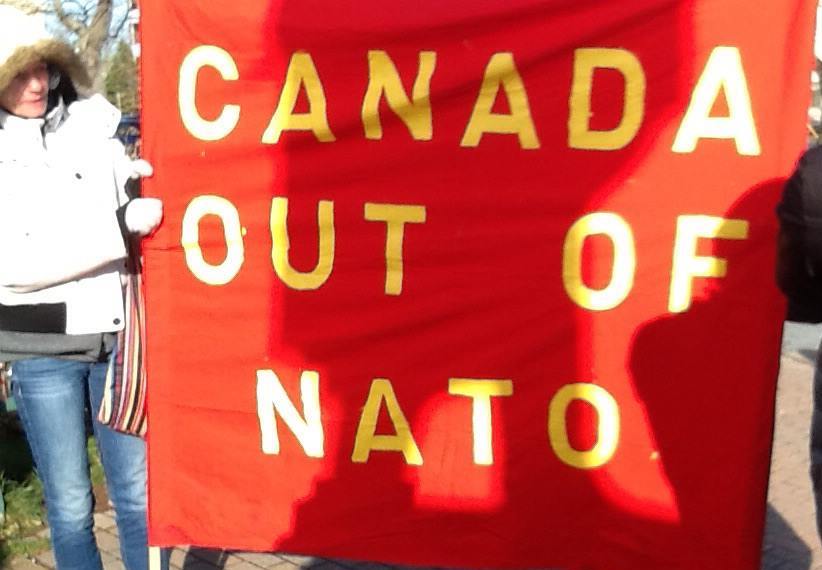 Another front of NATO's
aggressive focus today involves
cyber
warfare, information warfare and "election meddling." The changes
to the Canada Elections Act contained in Bill C-76 that
relate to combatting "foreign influence" and monitoring the use
of social media are informed by U.S. National Security Doctrine,
NATO and its Atlantic Council think tank as well as the Five Eyes
intelligence agencies. These organs represent the interests of
trans-Atlantic corporate and financial interests and the foreign
policy elite within the United States and Europe. The NATO
Association of Canada, for its part, is involved in the
behind-the-scenes changes being made to Canada's electoral system
and its electoral laws involving the control and regulation of
electoral and political communication. In the name of protecting
electors, a form of censorship is introduced to determine what is
legitimate. In social media, this affects, for example, those it
decrees to be "true believers," i.e. those who, in the words of
the intelligence agencies themselves, wittingly or unwittingly
become the dupes of Russia, etc., and are thus legitimate targets
of persecution. Social media corporations have taken actions
against alternative websites known for being critical of U.S. and
Canadian government foreign and domestic policies. These include
Counterpunch, the World Socialist Website, Global Research,
Consortium News, Mediamatters, Common Dreams, Democracy Now,
Wikileaks, Truthout, The Intercept, VenezuelaAnalysis, teleSUR
and others.
Another front of NATO's
aggressive focus today involves
cyber
warfare, information warfare and "election meddling." The changes
to the Canada Elections Act contained in Bill C-76 that
relate to combatting "foreign influence" and monitoring the use
of social media are informed by U.S. National Security Doctrine,
NATO and its Atlantic Council think tank as well as the Five Eyes
intelligence agencies. These organs represent the interests of
trans-Atlantic corporate and financial interests and the foreign
policy elite within the United States and Europe. The NATO
Association of Canada, for its part, is involved in the
behind-the-scenes changes being made to Canada's electoral system
and its electoral laws involving the control and regulation of
electoral and political communication. In the name of protecting
electors, a form of censorship is introduced to determine what is
legitimate. In social media, this affects, for example, those it
decrees to be "true believers," i.e. those who, in the words of
the intelligence agencies themselves, wittingly or unwittingly
become the dupes of Russia, etc., and are thus legitimate targets
of persecution. Social media corporations have taken actions
against alternative websites known for being critical of U.S. and
Canadian government foreign and domestic policies. These include
Counterpunch, the World Socialist Website, Global Research,
Consortium News, Mediamatters, Common Dreams, Democracy Now,
Wikileaks, Truthout, The Intercept, VenezuelaAnalysis, teleSUR
and others.
The peoples of the world fight to realize their aspiration for peace every day. All over the world, as they affirm their rights and fight for the rights of all, they translate their desire for peace, freedom and democracy -- hijacked at the time of NATO's founding -- into a political force which puts decision-making in their own hands. Taking up the demand to Make Canada a Zone for Peace is to occupy the space of change. In Canada, the demand to Make Canada a Zone for Peace is aimed, amongst other things, at making sure that Canada's foreign policy does not cause harm to other peoples as is presently the case.
Whether or not NATO
survives in its present form, what is certain is that the peoples'
striving for peace, freedom and democracy today is favoured by taking
up the call to make their countries zones for peace and by uniting in
action to establish anti-war governments which express a modern
democratic personality which defends the rights of all as a matter of
principle.
The strength of the people's striving for peace and the defence of the rights of all cannot be underestimated or downplayed. Attempts to smash this movement and deprive the people of a collective consciousness and action must be opposed. This includes waging the ideological struggle against attempts to portray military interventions abroad as being about "responsibility to protect," "peacemaking" and upholding a rules-based international order and other fairy tales.
The meetings, rallies and articles on the occasion of the 70th anniversary of NATO involve activists and experts from different backgrounds who take principled stands that the existence of NATO is incompatible with the desire of the people for a modern and humane conception of security based on defending the rights of all, for an independent foreign policy based on making Canada a zone for peace, and for nation-building on a modern basis.
On the occasion of the 70th anniversary of the founding of NATO, let us contribute to sorting out the issue of how to take Canada out of NATO and make sure NATO is dismantled. Most importantly, no matter which direction NATO now goes, let us contribute to making Canada a Zone for Peace.
Demonstrations in Canada in the 1960s, 1970s and 1980s
Against NATO and Imperialist War Preparations
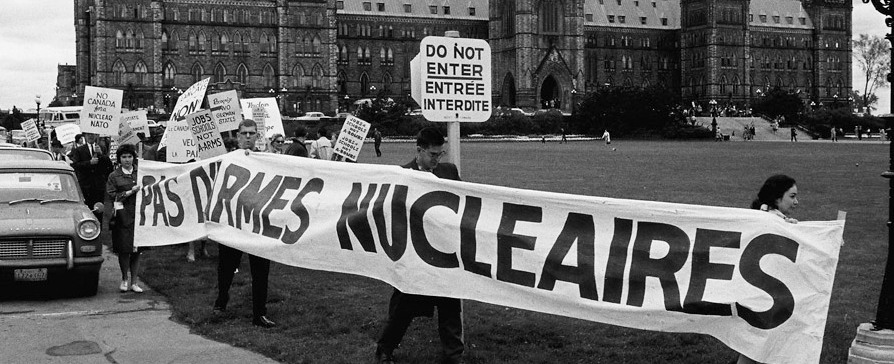
Demonstration outside NATO ministerial meeting in Ottawa in 1963.
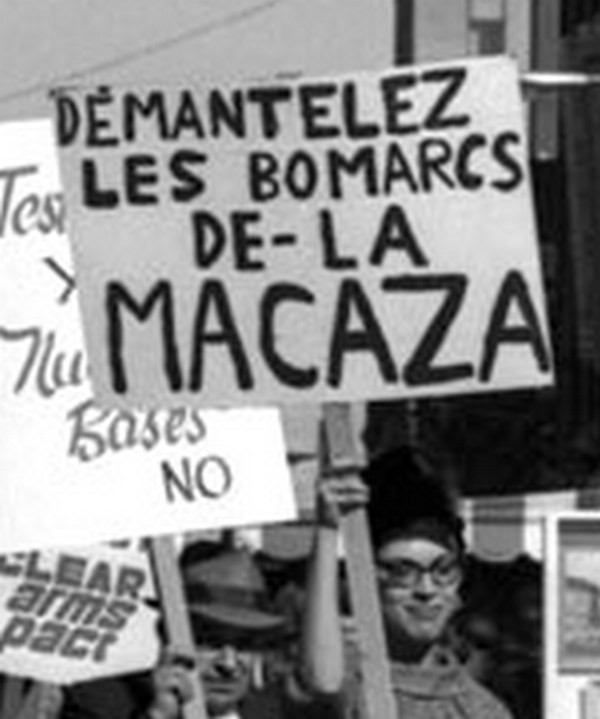
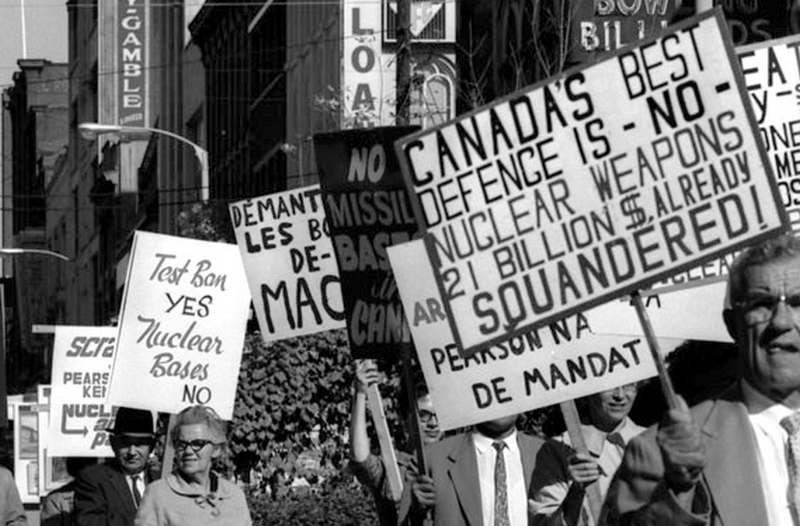
Demonstration on Sparks Street in Ottawa, circa 1963, opposes the
Pearson Liberal government's agreement to allow U.S. nuclear missiles
on Canadian soil.
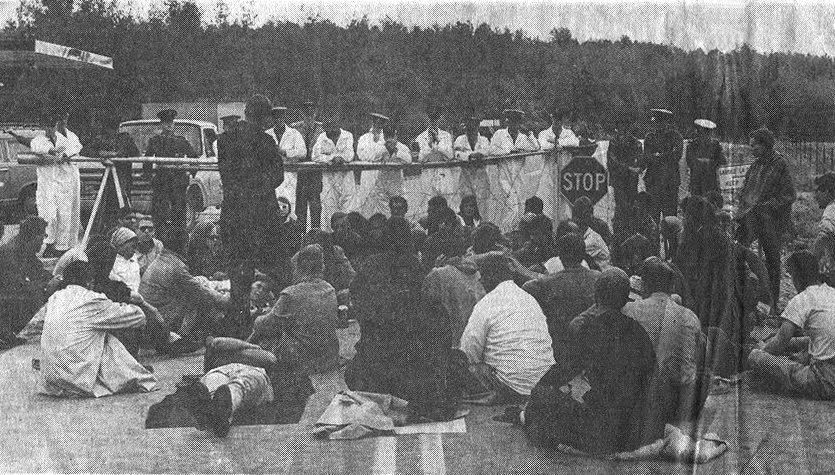
Protestors hold sit-in at the entrance to the Bomarc missile base in
La Macaza, Quebec, September 9, 1964.

Demonstration outside NATO ministerial meeting in Ottawa, 1974.

Demonstration in Vancouver against visiting U.S. warship, July 17,
1982, calls for
Canada to get
out of NATO and NORAD.
Demonstration in Toronto, March 17, 1985 against Reagan's visit. In the mid 1980s actions took place in many cities, organized by CPC(M-L), against imperialist war preparations and U.S. dictate.
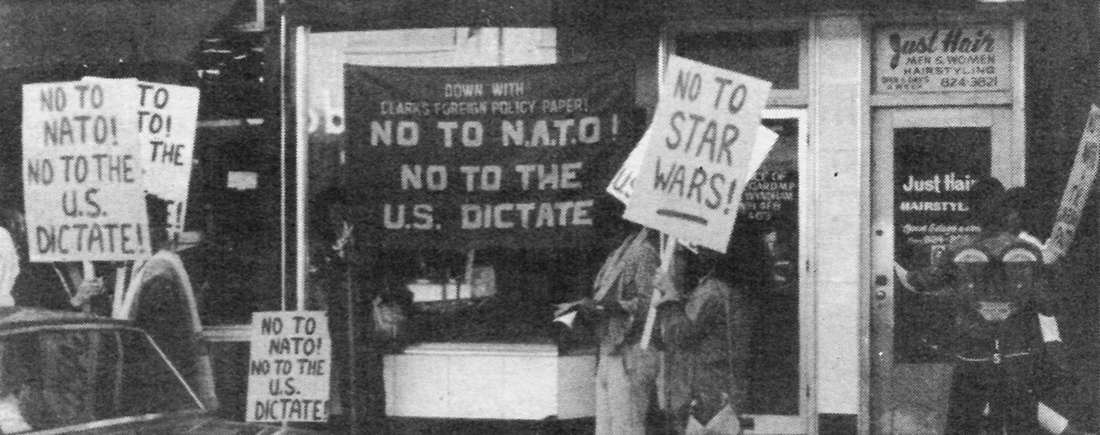
Demonstration in Guelph against Cruise missile testing, June 14, 1985,
outside local MP's office.
Demonstration in Winnipeg, January 19, 1988, against Cruise Missile testing in Canada.
Notes
1. "The Alliance's New Strategic Concept," NATO, November 8, 1991.
2. Nye, Joseph. The Paradox of American Power. London: Oxford University Press, 2002. p. 33Palestinian Land Day
Long Live the
Palestinian People and
Their Resistance!
|
|
On March 30, 1976, six Palestinians from Arab villages inside the Green Line were shot and killed by Israeli forces while protesting the confiscation of 5,500 acres of land from the Galilee. Since then, Land Day has been commemorated by Palestinians inside Israel as well as in the West Bank, Gaza and Jerusalem and around the world.
|
|
Continuous protests have been held every
Friday
since last year when a Mass March of Return, involving thousands of
people from Gaza and the West Bank marched for over 46 days to
converge en masse on the Gaza Strip's roughly
45-kilometre-long eastern border with Israel. The action
culminated on May 14 to mark the 70th anniversary of Al Nakba
(The Catastrophe) in which the brutal and genocidal displacement
of the Palestinian people, that continues to this day, accompanied
the creation of the Zionist state of Israel. The courage and
persistence which mark the resistance of the people in the
occupied territory of Palestine are legendary. The resistance of
the Palestinian people to the Zionist occupiers by which,
generations later, all those displaced as well as their
descendants fully affirm their right of return as codified in
international law is indomitable.
On this occasion, the Communist Party of Canada
(Marxist-Leninist) salutes the Palestinian people, our hearts
seething with the pain and sorrow they are forced to endure and
deep appreciation for their humanity in the face of the most
heinous crimes which will go down in the annals of the greatest
infamies ever committed against a people. Long live your struggle
-- long live your resistance and love of life which are bound to
prevail!
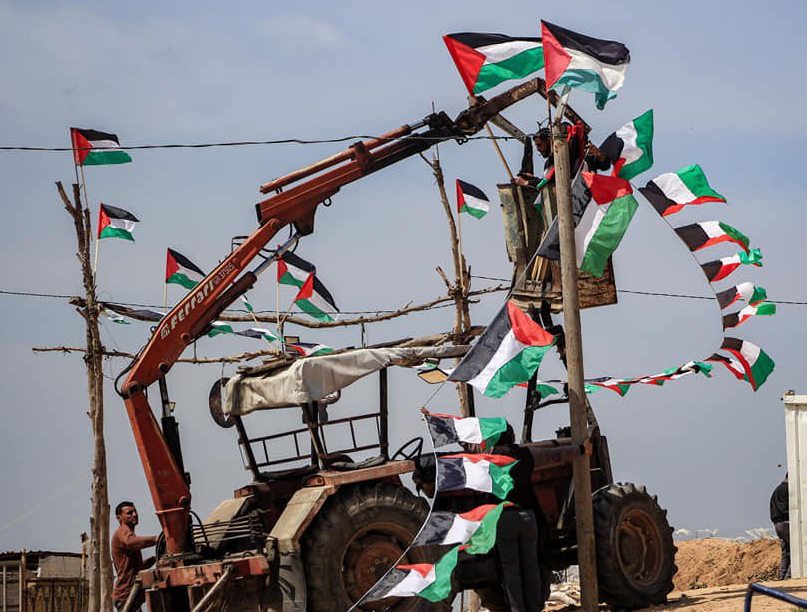

In Gaza, near the Israeli border, Palestinians gather and prepare for
March 30 Land day marches and celebrations of one year of the Great
March of Return.
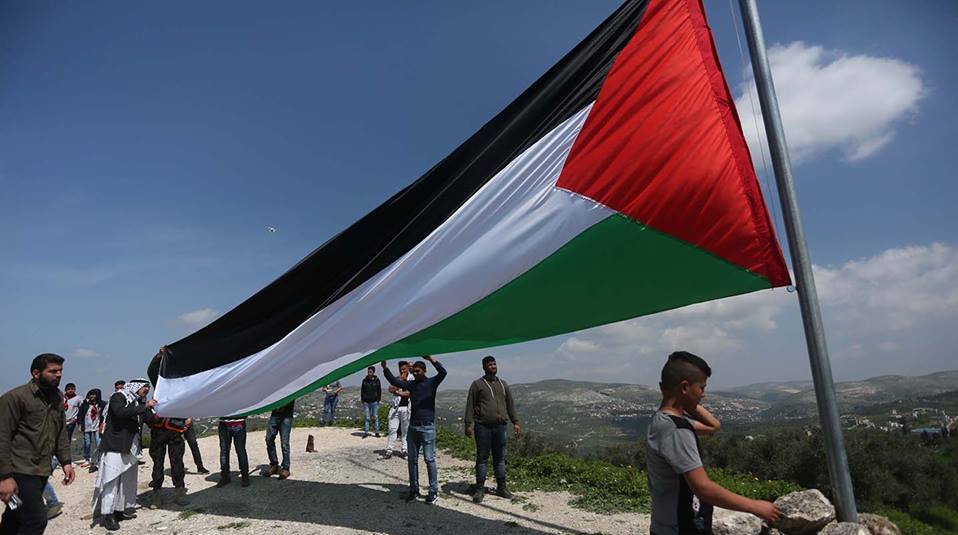
Raising the Palestinian flag in Nablus, March 28, 2019.
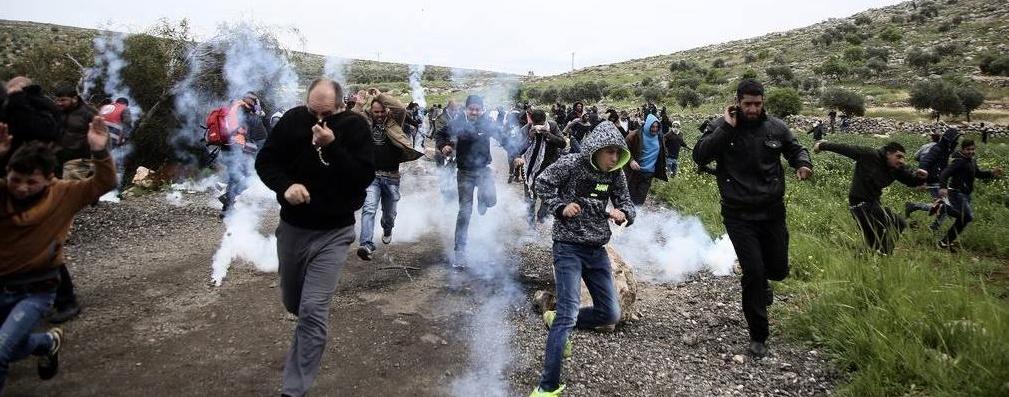
Al Mughayer, March 28, 2019
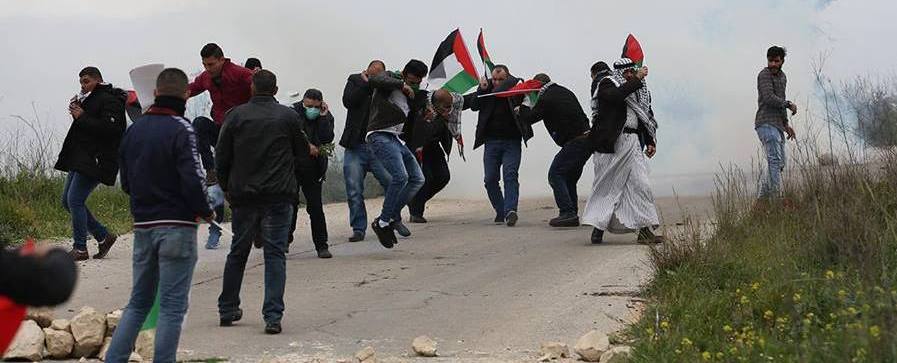
North of Ramallah, March 28, 2019.
UN Inquiry into
2018 Gaza Protests
Concludes
Israel's Violations of Human Rights and International
Humanitarian Law Warrant Criminal
Investigation and
Prosecution
An independent UN report into last year's protests along Gaza's border fence involving Israeli security forces, that resulted in the shooting deaths of more than 180 Palestinians, concluded on [February 28] that there are "reasonable grounds" to believe Israel violated international humanitarian law.
There was "no justification" for Israeli forces to use live rounds, according to a press release issued by the UN Commission of Inquiry into the 2018 Gaza protests.
 "The Commission has found
reasonable grounds to believe
that
Israeli security forces committed serious violations of human
rights and international humanitarian law," Chairperson Santiago
Canton told journalists in Geneva.
"The Commission has found
reasonable grounds to believe
that
Israeli security forces committed serious violations of human
rights and international humanitarian law," Chairperson Santiago
Canton told journalists in Geneva.
He added: "These violations clearly warrant criminal investigation and prosecution and we call on Israel to conduct meaningful investigations into these serious violations and to provide timely justice for those killed and injured."
Created by the 47-Member UN Human Rights Council in May last year, the Commission of Inquiry was tasked with investigating all violence linked to anti-Israeli demonstrations on the Israel-Gaza border from March 30 to December 31, 2018.
In total, the Commission conducted 325 interviews with victims and witnesses and analyzed audio-visual material showing demonstrators being shot.
Its findings indicate that Israeli Security Forces injured 6,106 Palestinians with live ammunition at protest sites during the period of its mandate, while another 3,098 Palestinians were injured by bullet fragmentation, rubber-coated metal bullets or by tear gas canisters.
Four Israeli soldiers were injured at the demonstrations, the report also found, noting that one Israeli soldier was killed on a protest day "but outside the protest sites."
Ahead of the one-year anniversary of the beginning of the protests on March, 30, 2018, which Gazans refer to as the "Great March of Return," the Commission of Inquiry underscored the need for Israel and the Hamas-controlled Palestinian authorities to do more to protect civilians, who continue to demonstrate near the border fence every Friday.
"The Commission found reasonable grounds to believe
that
Israeli snipers shot at journalists, health workers, children and
persons with disabilities, knowing they were clearly recognizable
as such," it said in a statement.

Memorial April 13, 2018 for a young journalist killed by Israeli forces.
Commissioner Betty Murungi described how an 11-year-old boy was shot while playing football near the fence with Israel. He subsequently had one of his legs amputated.
"Although the killings have lessened, we still see protected groups of individuals, including children, still being killed as recently as three weeks ago," said Commissioner Sara Hossain.
She added that paramedics and journalists also continue to be injured at demonstration sites, while also dismissing the idea that the protesters were intent on violent acts.
"We found that in all of the demonstrations, there was violence in the form of the use of the throwing of stones and burning of tires by a minority of demonstrators," she said, adding that "the vast majority" were not involved in any form of violence.
"There were women and children present, there were
people
having poetry readings, playing music, waving flags, things that
can't in any way be considered to be violent," she insisted: "I
think the characterization of all the demonstrators as violent is
something we wouldn't agree with."


Reading chain protest and childrens' cultural programs at Great Return
March camps.
De Facto
Authorities 'Must Encourage Peaceful Protests'
In addition to the appeal to Israel to cooperate with an investigation into the killings, Commission chairperson Santiago Canton called on the de facto authorities in Gaza to ensure that demonstrations were peaceful.
"The Commission finds that these protests were a call for help from a population in despair," Santiago Canton said. "Not only Israel but also the de facto authorities led by Hamas and the Palestinian Authority have responsibilities towards them.
Mr Santiago also noted the Commission's call for Israel to lift the blockade of Gaza, and in particular allow those in need of urgent medical care to leave the territory, after it found that hospitals there were "literally overwhelmed by the sheer number of death and injuries" after demonstrations on May 14.
The Commission of Inquiry's full report was presented to the Human Rights Council on March 18.
For the full text of the report click
here.
(UN News)
Trump Promotes Theft
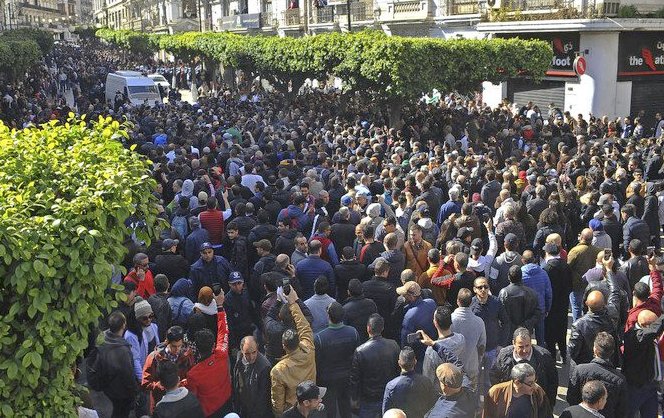
Demonstrations across Syria, March 26, 2019, repudiate Trump statement
favouring Israeli annexation of illegally occupied Golan Heights.
On the eve of Israeli Prime Minister Benjamin Netanyahu's visit to the United States, President Donald Trump, in his usual Twitter channel, has declared to be in favour of recognizing Tel Aviv's sovereignty over the Golan Heights, a Syrian territory illegally annexed by Israel after the Six Days' War (1967). Last November a vote took place in the United Nations General Assembly to confirm null and lacking any juridical value the said annexation, and for the first time the U.S. government voted against the resolution. The rest of the world's nations, with the exception of Israel, voted in favour.
The most recent absurdity of the former TV presenter, now head of State, creates an unfortunate precedent for world stability and lawfulness, since it legitimizes the use of force for territorial plunder and booty. To size up the disgraceful nature of this position, suffice it to point out that in the perspective opened by Trump, the invasion and occupation of Kuwait by Iraq in 1990 would have granted Saddam Hussein's regime sovereignty over the small but immensely rich nation, and the United States would have lacked reason to launch the devastating Gulf War to liberate the oil emirate.
The tycoon's reckless irresponsibility, of potentially
catastrophic consequences for the Middle East, should be
understood as another one of his typical electoral manoeuvers, in
this case as a gift to his ally and ideological twin. Indeed,
Israel will be celebrating anticipated parliamentary elections
next month, in which Netanyahu is forced to participate because
of the rupture of his governmental alliance, as political
challenges have emerged in recent weeks (including solid grounds for
accusations
of corruption against the prime minister) that threaten the
continuation of the rightist and ultra-rightist coalition
governing in Tel Aviv.
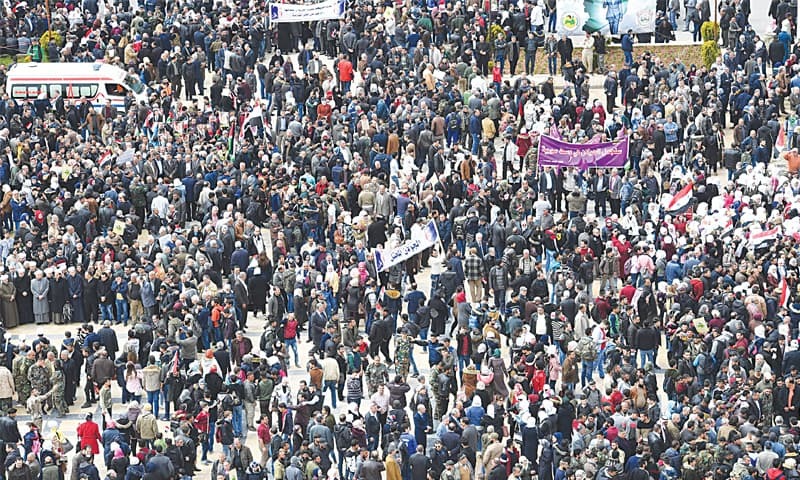
Protest in Aleppo, Syria, March 26, 2019.
An additional implication of this gesture is that it opens the door to a subsequent recognition of the de facto annexations perpetrated by Israel in a large part of the West Bank and East Jerusalem (Palestine), which would mean the consummation of the most brutal plundering of a nation's territory in modern history.
Thus, fragile regional and world stability is threatened by a coarse attempt to influence the Israeli electors in favour of recalcitrant Zionism, while Trump pleases the islamophobic sectors in his own militant base.
The international community would have to consider this manoeuver unacceptable and condemn in the strongest terms this supplanting of the principles of global coexistence by the exchange of favours between reactionary and warlike elites.
(Editorial, March 22, 2019. Edited for grammar and clarity by TML.)
Cuba Condemns USA's Recognition of Occupied Syrian Golan as Israeli Territory

Demonstration in the occupied Golan Heights, March 23, rejecting
Trump's stand on the
Golan Heights.
The Ministry of Foreign Affairs of the Republic of Cuba expresses its strongest condemnation of the declared intention by the government of the United States to recognize the occupied Syrian Golan as territory of Israel, which is a serious and flagrant violation of the United Nations´ Charter, of International Law, and of the pertinent Security Council resolutions, particularly Resolution 497 of 1981.
This new manoeuver of Washington, which violates the legitimate interests of the Syrian people and of the Arab and Islamic nations, will have serious consequences for stability and security in the Middle East, and will further increase the tensions in this volatile region.
Cuba urges the Security Council to fulfill the responsibility granted to it by the UN Charter to maintain international peace and security, and to adopt the necessary decisions to stop this unilateral action of the United States in support of Israel in its intentions to annex the occupied Syrian territory of the Golan Heights.
The Ministry of Foreign Affairs of the Republic of Cuba will continue to endorse the demand of the Syrian government for the recovery of the Golan Heights, snatched away by Israel in 1967, and once more demands the total and unconditional retreat of Israel from the Syrian Golan and from all occupied Arab territories.
Havana, March 23, 2019
(Non-official translation.)
Venezuela
Evidence of U.S.-Led Terrorist Plots

Mobilization for Peace rally in Caracas, March 24, 2019.
The latest evidence of U.S.-led terrorist plots in Venezuela came to light when evidence was found that foreign mercenaries disguised as Venezuelan military personnel were funded by assets seized from Venezuela as part of the U.S. economic war. TeleSUR reports that the government of Nicolás Maduro released telephone conversations and other evidence between leaders of the opposition planning violence against the country.
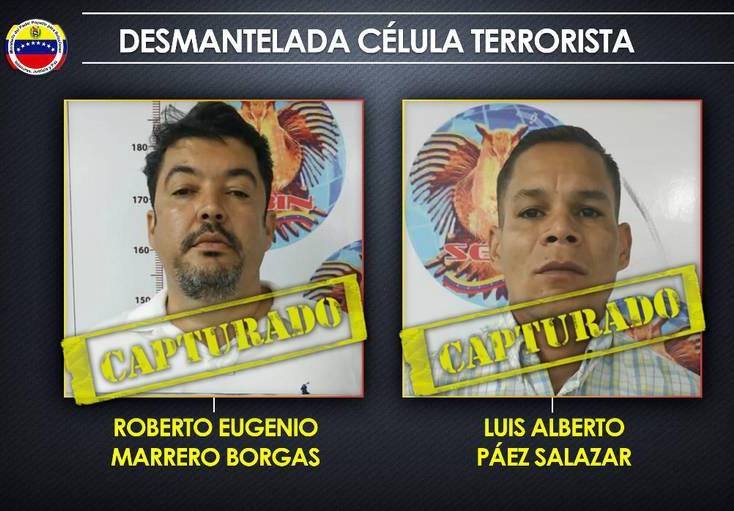 Earlier in the week,
Roberto Marrero, the so-called
chief-of-staff of the self-proclaimed president Juan
Guaidó who Canada supports, was arrested along with
Guaidó's bodyguard. Minister of Interior Relations and
Justice Nestor Reverol, said that the arrest uncovered new
evidence about the terror campaign planned by the U.S. and the
Venezuelan Opposition. Misión Verdad reports on a press
conference by Jorge Rodríguez, Minister of Communication
and Information, who described how the arrest of Marrero led to
the discovery of widespread terrorist plans. The new evidence
points to a plot funded by assets seized by the United States
from Venezuela and channelled into bank accounts through
Colombia.
Earlier in the week,
Roberto Marrero, the so-called
chief-of-staff of the self-proclaimed president Juan
Guaidó who Canada supports, was arrested along with
Guaidó's bodyguard. Minister of Interior Relations and
Justice Nestor Reverol, said that the arrest uncovered new
evidence about the terror campaign planned by the U.S. and the
Venezuelan Opposition. Misión Verdad reports on a press
conference by Jorge Rodríguez, Minister of Communication
and Information, who described how the arrest of Marrero led to
the discovery of widespread terrorist plans. The new evidence
points to a plot funded by assets seized by the United States
from Venezuela and channelled into bank accounts through
Colombia.
Reporting on the Rodríguez press conference, Misión Verdad describes how eight to 10 teams of assassins were being brought to Venezuela from Nicaragua, Honduras, Guatemala and El Salvador and being trained in Colombia to carry out terrorist acts in Venezuela. They planned selective assassinations of high-profile figures of the Venezuelan state and attacks on the country's public services. Half these groups had entered the country, while others were blocked by the shutdown of the borders over the phony attempt to deliver humanitarian aid.
The objectives of the terrorist plot were shown in a slide show by Jorge Rodríguez. Misión Verdad reports the slide described how Operación Libertad (or Operation Freedom) planned:
- selective killings of government officials;
- new sabotage to the Caracas Metro, the Cable Car and the electric service;
- false-positive operations or false flags by people
disguised as military deserters; and
- a general strike, an assault on the presidential Miraflores palace and terrorist actions such as the assassination of President Maduro.
The mercenary teams planned to conduct their terrorist acts disguised as deserters from the Bolivarian National Armed Forces to portray them as "military deserters." They sought to show a non-existent conflict between the Venezuelan military and the legitimately elected government.
Misión Verdad also reports that among the material seized from Marrero were cell phones that allowed investigators access to conversations, which showed $500,000 and $700,000 being spent per day to pay these assassins and to bribe members of the military to desert and join them. The money was deposited by NGOs created in January and February in accounts of Banesco and Bank of America by the Colombian government of Iván Duque after a request from Juan Guaidó. The communications indicate the funds came from money seized from Venezuelan companies by the United States. The money stolen from Venezuela that would be used to finance this operation would amount to $1 billion.
To add further to the hypocrisy of the United States, the Department of the Treasury sanctioned the Economic and Social Development Bank of Venezuela when Guaidó's "humanitarian aid" was seized on suspicion of terrorism.
Misión Verdad reports Guaidó himself and right-wing leader, Leopoldo López, who is under house arrest for previous violence, were implicated.
"On Marrero's phone, conversations were also found in a group called 'the General Staff,' made up of members of the Voluntad Popular Party. Among them, Leopoldo López is identified, in charge of his leadership; Freddy Guevara, in charge of advising on talking points for Guaidó; Marrero, the deputies Freddy Superlano and Sergio Vergara, and Juan Guaidó himself."
In these conversations, Guaidó described
"Operation
Freedom" which is consistent with these plans. Freddy Guevara
described how the operation is moving "from a strategy of siege
to one of assault" with selective assassinations and attacks
against public services. This is all consistent with
Guaidó's comments at a rally on March 22 in El Tigre,
Anzoátegui state, where he said: "Venezuelans do not beg
for our rights, so soon we are going together to Miraflores to
rescue the office of all Venezuelans," and told his followers "we
must organize because the dictator will not go out gently."
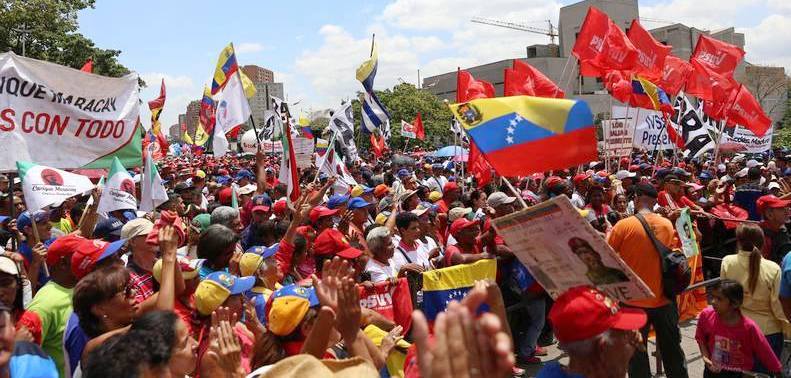
Caracas, March 23, 2019.
In a speech at the Mobilization for Peace rally outside of the Miraflores Palace on March 23, President Maduro described how the country is facing "the strongest imperialist aggressions that the Republic has ever survived in 200 years." Maduro said the people continue to be "the greatest guarantee of peace, democracy, and sovereignty of the Fatherland" against the attacks perpetrated by the Venezuelan right-wing and the U.S. Regarding the plans of the terrorist cell described in the article, he assured the people: "We are going to capture them and hand them over to justice."
Those opposed to U.S. intervention in Venezuela will be holding a mass protest at the White House on March 30 to kick off a week of action against NATO and the war against Venezuela.
(With files from TeleSur and Misión Verdad)
Colombia
Adherence to Peace Agreement Demanded
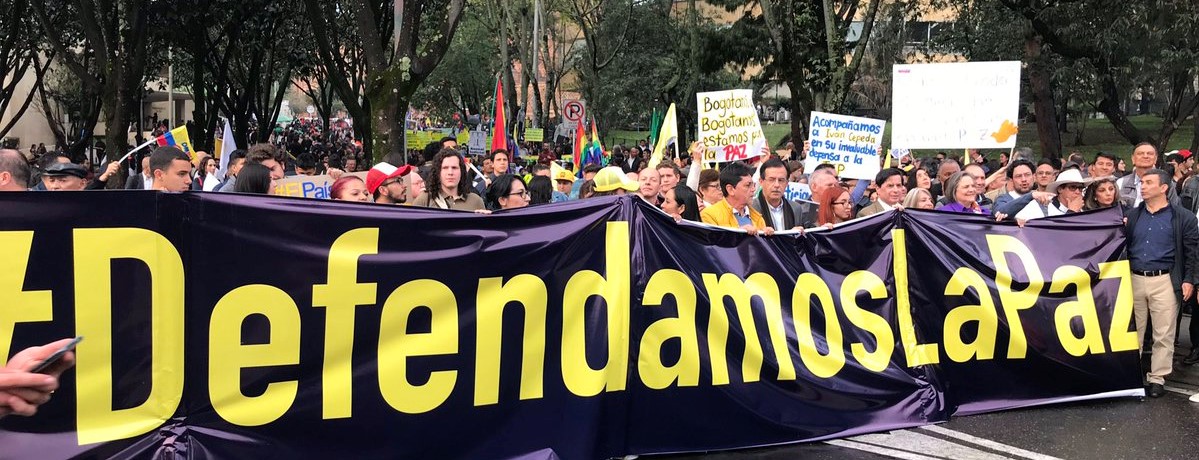
Thousands of people demonstrated in Bogotá and other
cities around Colombia on March 18, 2019 to demand the government of
Iván Duque stop obstructing implementation of the Special
Jurisdiction for Peace.
On March 8, Cuba and Norway, guarantors of the peace process which culminated in a Final Peace Agreement between the Colombian government and the Revolutionary Armed Forces of Colombia-People's Army (FARC-EP), issued a series of considerations on the adoption of the Statutory Law of the Special Peace Jurisdiction (JEP).
The guarantors urged Colombian state institutions to "guarantee the protection of the Final Agreement and ensure strict compliance with the agreement," including "the provisions regarding the JEP," which was projected and agreed upon with the purpose of guaranteeing truth, justice, reparation, and non-repetition. "If this path is obstructed, the backbone on which the Final Peace Agreement was built will be damaged, and implementation will remain pending in its most fundamental aspects," warned Cuba and Norway, expressing concern for the impact on victims and former combatants who have already laid down their arms as established.
The President of the Republic of Colombia, Iván Duque Márquez, announced on March 10, "Following an analysis, I would like to announce to Colombians a decision I have made and explain my arguments face to face with the country. I have decided to file objections to six of the 159 articles of the Statutory Law for the Special Peace Jurisdiction (JEP), for reasons of inconvenience and invite the Congress of the Republic to a constructive debate," which has been interpreted by those who support the peace process as a serious obstacle to its progress.
In Colombia, hundreds of demonstrators protested
President
Duque's objections to the Special Peace Jurisdiction, one of the
pillars of the agreement with the FARC-EP. The law in question needs
only the President's
approval to enter into effect.
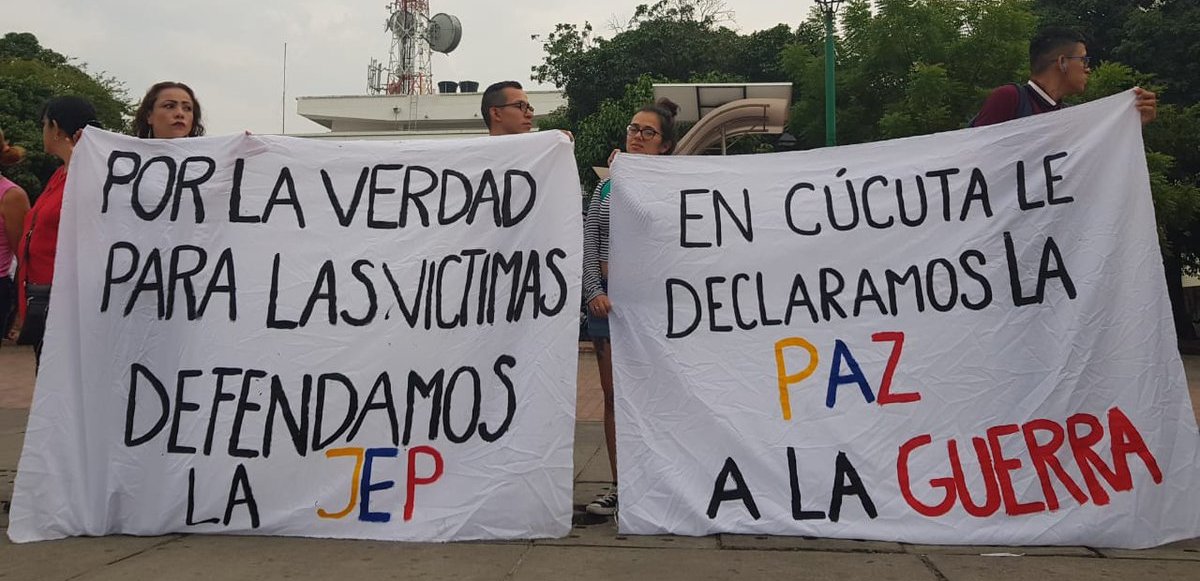
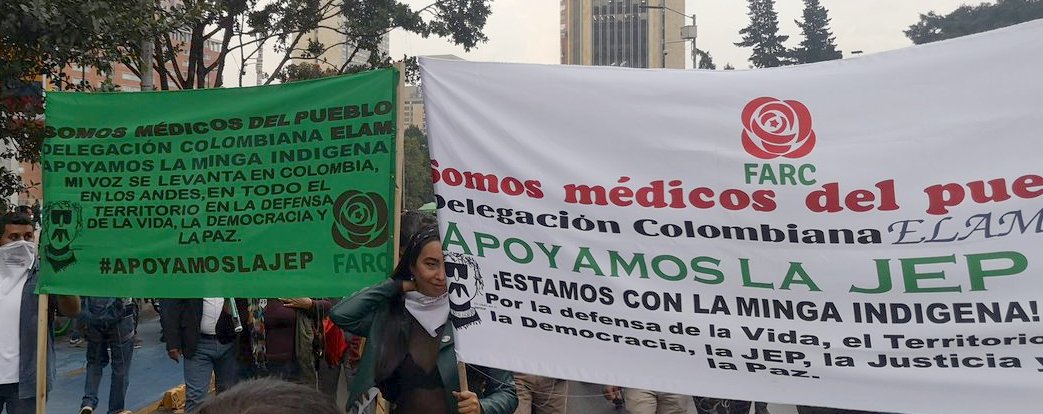
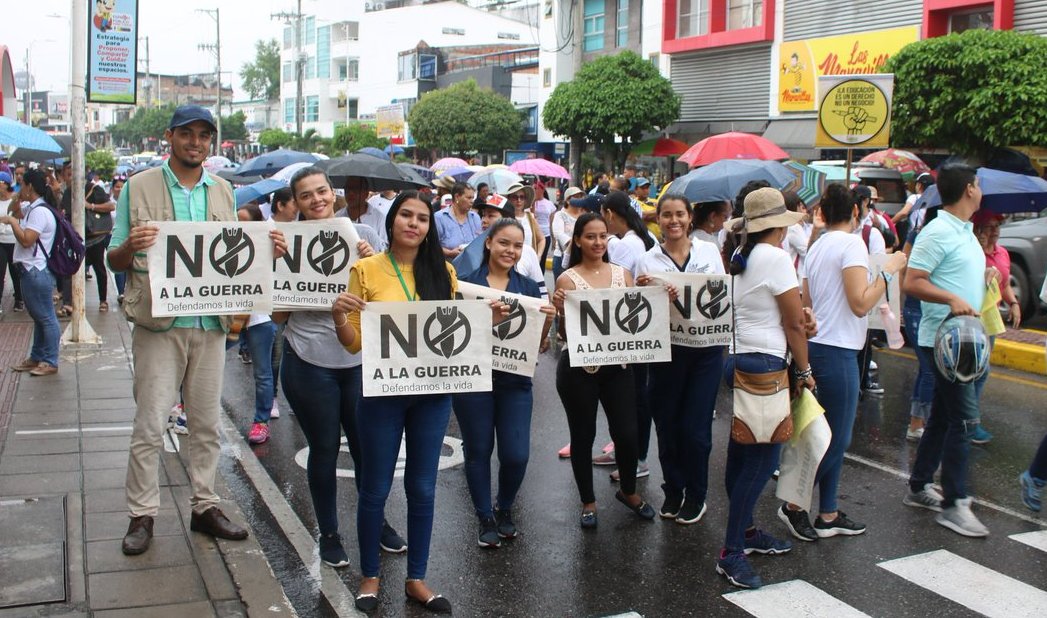
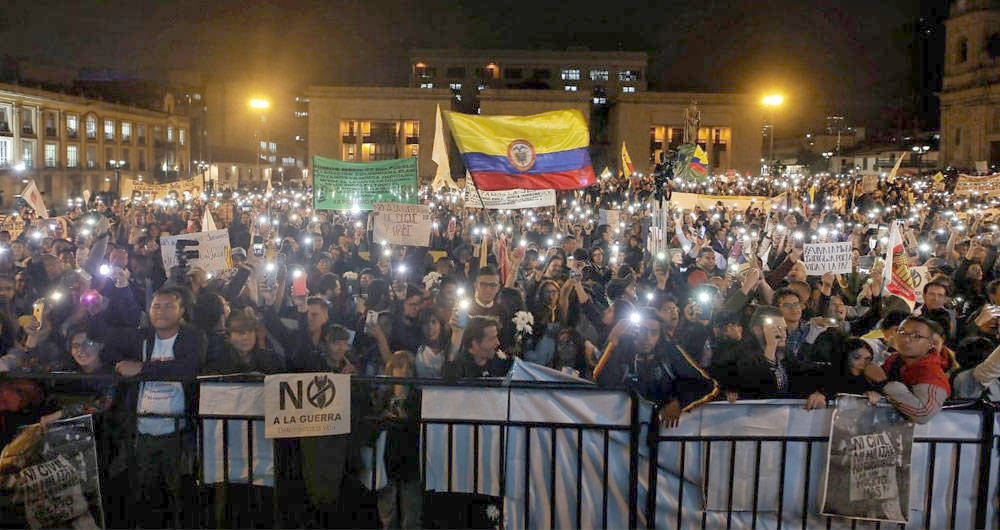
Demonstrations for peace across Colombia, March 18, 2019.
In a letter sent to António Guterres, United Nations secretary general, members of the delegation which in the name of the Colombian government and the FARC-EP negotiated the Peace Agreement; legislators on the Peace Commission of the Senate and House of Representatives; former ministers and government officials; victims of the armed conflict; leaders of organizations and institutions in Colombian civil society; academics; commentators; intellectuals; along with citizens working for peace and national reconciliation, stated, "We express to you our deep concern regarding attempts to seriously damage implementation of the Agreement, the structure and functioning of the JEP, as well as the system designed to honor the rights of victims."
The signatories added, "In order for the JEP to achieve its objective of holding accountable before the law all those responsible for crimes against humanity, war crimes, in general, serious violations of human rights, it must have all the institutional, financial, and legal tools it needs, given the scope of the task.
"If this is not so, the full exercise of its responsibilities could be at risk and situations could arise in which the lack of legal tools allows for impunity and limits guaranteeing the rights of victims."
They recall that the law "guarantees the financial autonomy of the JEP, and its budget has already been questioned by the government party, which described it as extremely high."
The United Nations has requested that the integrity of the Peace Agreement be respected, considering it key to the peace process in Colombia, where the transitional nature of the process is emphasized, and the President's insistence on creating new obstacles, and reviving past debates, raises concerns.
(Granma, March 26, 2019)
National March for
Life Gains Support
and Momentum
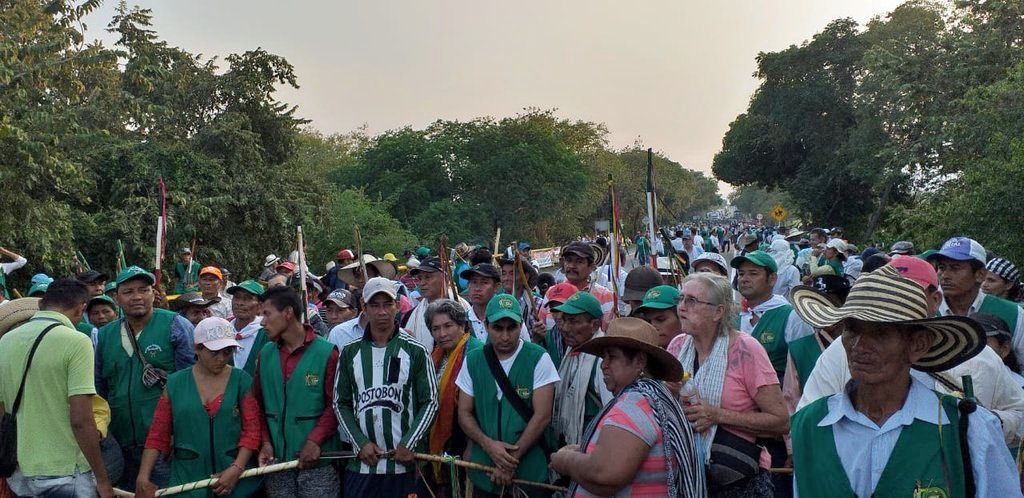
March 29, 2019, National March for Life.
For three weeks, Colombia's Indigenous and Campesino
National March For Life has been growing in numbers and momentum.
The march, organized by the National Indigenous Organization of
Colombia (ONIC) and the Regional Indigenous Council of Cauca
(CRIC), is gaining support as other land and human rights
organizations from the departments of Cauca, Nariño, Antioquia,
Choco and Putumayo demand the full implementation of the
country's 2016 Peace Accords signed between the government and
the Revolutionary Armed Forces of Colombia (FARC).
 The Peace and Reconciliation
Foundation (Pares) reports
that
the Indigenous Unit of the Awa People (UNIPA), the Ingas
Indigenous of Putumayo, and Kamentza communities from Nariño are
all joining the march that has shut down major highways south of
Cali and affected traffic and transportation as far south as the
border with Ecuador.
The Peace and Reconciliation
Foundation (Pares) reports
that
the Indigenous Unit of the Awa People (UNIPA), the Ingas
Indigenous of Putumayo, and Kamentza communities from Nariño are
all joining the march that has shut down major highways south of
Cali and affected traffic and transportation as far south as the
border with Ecuador.
The activists are demanding that the Peace Accords signed in Havana, Cuba be fully implemented. This includes the protection of the leaders of the Campesino and Indigenous social movement whose lives are continually threatened by paramilitary groups and hired gunmen for their land.
"More than 420 Awa Indigenous people have been killed in recent years, more than 800 displaced between 2016 and 2019 and 64 have been threatened," UNIPA said in a statement. "Our children suffer from malnutrition and our young people are threatened by armed groups present in the area," the Awa communique read.
Between November 2016 and 2018 over 420 activists were murdered, according to the Colombian government. The Colombian army said on March 26 that it had found a total of four bodies that day in Buenaventura where the march is taking place. Since the march began three weeks ago the Colombian military has attacked demonstrators several times. On March 19 the Mobile Anti-Disturbances Squadron (ESMAD) and the National Army opened fire on protesters in La Augustina, south of Cali injuring at least three people, the CRIC informed. The organization says security forces have fired tear gas, grenades, bullets and short and long range weapons at the march participants.
Colombian President Iván Duque is currently
trying to amend
and weaken the Peace Accords through a legislative process. He
said he will not meet with the representatives of the now more
than 5,000 marchers until they reopen the highway. CRIC leader
Aida Quilcue responded saying, "We have been clear. If you tell
us when the president will arrive, we'll consider opening the
road."
"To date, more 35 criminal reports have been made, including against the detainment of 13 marchers," said CRIC in a communique. At least 10 Indigenous community members have been murdered by the state forces that have injured another 15.
United Nations High Commissioner for Human Rights
claimed in her recently published annual report that Colombia saw
an upsurge in violence last year.

March 24, 2019 in Alto Putumayo.
According to national police statistics, in 2018, 49.5 per cent of municipalities reported an increase in homicide rates with respect to 2017. For example, in the municipalities of San Jose de Ure in the department of Cordoba and Barrancas in the department of La Guajira, the homicide rates rose by 1,473 per cent and 880 per cent respectively. The UN Commissioner observed that in 2018, the number of massacres increased by 164 per cent with respect to 2017, going from 11 to 29 cases. In 2018, such cases were concentrated in Antioquia, Cauca, Norte de Santander and Caquetá. More cases of murder of human rights defenders were noted in the first three of those departments.
Defense Minister Guillermo Botero challenged the Human Rights Commissioner's report. According to Botero, the UN claim that 29 massacres took place in 2018, representing a 164 per cent increase from the previous year, is false. The Defense ministry reported that 78 people were killed in massacres in 2018, a 37 per cent increase compared to the year before, but never revealed December's statistics.
The UN report identified a wide range of structural problems within Colombian society that are causing violence and called on Duque's administration to do more. In particular, the government is called on to address its neglect of certain areas and its failure to implement many aspects of the peace process, which the UN is responsible for monitoring.
"OHCHR observes that 93 per cent of the cases it monitored were in regions with structural causes linked to a persistent lack of access to rights by the population -- primarily to justice and to economic, social, cultural and environmental rights," read the report.
The above-mentioned structural causes derive largely from the weak or even lack of state presence in certain rural areas, as recognized by President Duque in his inaugural speech. They also stem from substantial delays in the implementation of the peace agreement, especially regarding comprehensive rural reform and the substitution of illicit crops. In order to mitigate the risks for human rights defenders, the state should maintain its presence, including through civilian authorities, recognize and promote the participation of civil society with full guarantees of association, assembly and expression, and accelerate implementation of the peace agreement in the regions concerned, which would support the work of defenders by expanding civic space.
In particular, the report criticized the current administration for its ongoing resistance to the establishment of the Special Jurisdiction of Peace (JEP), which aims to try those guilty of war crimes over the course of more than half a century of armed conflict.
Duque's party, the Democratic Centre that is led by
former
President Alvaro Uribe, is opposed to the peace process.
(TeleSUR)
Cuba
There Is but One
Foreign Policy of
the Cuban Revolution
As extremely challenging, President Díaz-Canel described the current international situation, on March 18, during the Ministry of Foreign Affairs' (Minrex) annual review, during which the institution's work in 2018 was fully analyzed.
Assuming the challenge with "firmness and intelligence to avoid isolation, without conceding in principle or in position," was the appeal made by the Cuban leader. What we can do on the diplomatic, economic, and communicational fronts plays a fundamental role, he said.
Díaz-Canel shared reflections on aspects of international policy related to Our America, where the capitalists' colonial, neo-liberal strategy is evident, including the resurgence of the Monroe Doctrine, and the tightening of the blockade, especially in the financial arena.
Within this context, he said, a key role is played by Minrex, the protagonist of important battles in 2018, in which the Cuban people felt themselves well represented. "Every time there is diplomatic victory on the international level, the people feel it, as a victory for the country," he said.
At the current time, he continued, when a return to a confrontational period is occurring, and new dangers emerge that must be faced, it is imperative that we are increasingly better prepared. In this context, he said this ministry has been able to add to the talent of more experienced functionaries a new generation of young diplomats -- with a high level of revolutionary consciousness and commitment.
Amongst us all, we must defend the legacy in foreign relations which the Comandante en Jefe has left us, and what it means, the President emphasized, by implementing an independent, anti-imperialist, counter-hegemonic foreign policy, in which friendship and international solidarity, security and world peace prevail.
The generational change which the country is gradually making, under the leadership of the Communist Party and its First Secretary, Army General Raúl Castro Ruz, should not give anyone illusions that there will be a change in Cuba's foreign policy, "The foreign policy of the Cuban Revolution continues to be, and will be, the same, the one to which we must all contribute," he stated.
Illustrious men in the nation's history have been part of this Ministry, like Alejo Carpentier, Fernando Ortiz, and Raúl Roa. There are many men and much work to honor, he emphasized, and we can best do so precisely by assuming the challenges and overcoming them. This ministry has achieved results and recognized prestige in its 60 years of revolutionary diplomacy.
He highlighted the need to continue working with Cuban émigré communities abroad, not only in the United States. Our island was born of "immigration and mestizaje, and we cannot ignore that many Cubans living abroad are proud of and miss their homeland." In this context, he insisted that a migratory policy must be crafted to invite all to contribute to the development and defense of the homeland, to the extent that each individual can. "We do not have to agree on everything, but we can work together."
The President noted the impact of the consular services Minrex provides, for Cuban residents here and abroad, emphasizing that quality must be continually improved, as well as reception and professionalism.
He insisted that the basic premises guiding government work apply to the Ministry as well, and be apparent in daily efforts.
The discussion, once again, addressed cardinal issues such as the need for more efficient pubic administration; the characteristics that the skilled workforce must develop within the arena in which they operate; the sensibility to eliminate obstacles and bureaucracy, in all entities where appropriate, to reduce paperwork and allow more timely responses to concerns.
Public communication must be one of the main lines of action, he said, citing as another challenge, "Constructing, amongst all, a social communication strategy that is more coherent and active."
He stressed the importance of working with the press not only on the big issues, and continuing to expand a Minrex presence on social media, in reference to which, it is crucial to "evaluate what we are achieving and what is missing," to increasingly perfect our messages. This virtual reality has an enormous impact that we cannot ignore," the President said.
Likewise, he reiterated the importance of computerization in both internal and external processes, including those involving the population, in which national systems must play a leading role.
On another issue, he called for the use of scientific research as a fundamental tool to help facilitate unraveling the complexities of various questions linked to international relations, such as current issues like human rights, migration, labor legislation, and others.
The President emphasized the extensive legislative effort just beginning to adjust laws in accordance with the new Constitution, noting that different bodies will be called on to support the drafting of these new laws in their area of competence.
Recalling the important role of the Foreign Ministry in supporting the country's priority economic efforts in the international sphere, Díaz-Canel noted areas such as seeking more efficiency in attracting foreign investment; the need to develop productive chains with foreign investment projects, tourism, and the non-state sector; becoming aware of and taking advantage of all opportunities for financing around the world; the defense of national products; and improving quality in the provision of services.
Finally, he described the analysis conducted as crucial, highlighting the concrete proposals made, connected to the reality we are living. We have "a mature, revolutionary diplomacy, heir to the ideas of Martí, Fidel, and Raúl, and have important challenges ahead that we will face from the front line of combat."
International Work Must Be Integrated
Foreign Minister Bruno Rodríguez Parrilla presented an evaluation of principal aspects of the country's foreign policy work, focusing on the numerous challenges the Ministry will be facing this year, given the complex international situation.
During the review, also attended by Ricardo Cabrisas Ruiz, a Council of Ministers vice president; Rodrigo Malmierca Díaz, minister of Foreign Trade and Investment; as well as other Party and government leaders, it was noted that, this past year, Cuba has conducted "a foreign policy of peace, cooperation, and solidarity, in defense of international law; balanced, sustainable development; and the promotion of more just economic relations for developing countries."
Several participants in the discussion noted that bilateral relations with the United States in 2018 were challenging, agreeing that this issue is central to all of the Ministry's diplomatic work. The historic victory in the United Nations General Assembly was highlighted as key to confronting the economic, commercial, and financial blockade, confirming the international community's overwhelming support to Cuba's resolution demanding an end to this hostile policy.
New challenges were noted as well, especially the worsening of the U.S. government's persecution of Cuba's financial transactions abroad.
Within the regional context, Cuba's solidarity with the Bolivarian Revolution was reaffirmed, and the commitment of our foreign policy to the unity of progressive forces and social movements in Latin America and the Caribbean.
Several participants agreed that no foreign policy action can be conceived without a communications plan. The current battle on social media must be waged with greater intensity, as a challenge not present in other eras, they noted.
During the exchange, also discussed was the Ministry's commitment to training new generations of diplomats at the Raúl Roa García International Relations Higher Education Institute.
The idea that all must contribute to defending Cuba was emphasized in the meeting. Thus the need to carry out increasingly more comprehensive work in all environments in which Cuban foreign policy plays a role, interacting and creating ties with all sectors.
(Granma, March 25, 2019)
(To access articles individually click on the black headline.)
Website: www.cpcml.ca Email: editor@cpcml.ca

